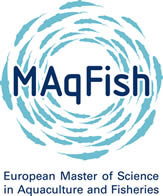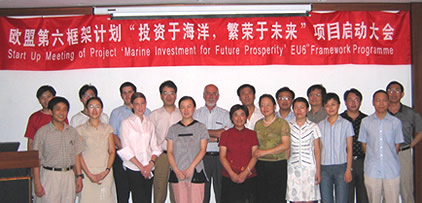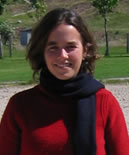

Training News - August 2004
Author: AquaTT
Date: 31 Aug 2004
AUGUST 2004 A free e-mail news service provided by AquaTT on European Education & Training
in Aquaculture.
Contents
3. Announcements
5. Student Corner
New “European Masters of Science in Aquaculture and Fisheries� approved by the
Erasmus Curriculum Development programme
 The University College Cork (Ireland), University of Bergen (Norway), the Norwegian University of Science and Technology, Trondheim (Norway), Wageningen University (Netherlands), Universidade do Algarve (Portugal), Ghent University (Belgium) and the University of Warmia & Mazury in Olsztyn (Poland) are teaching and research institutions with international reputation in aquaculture and fisheries. These universities share a similar mission, academic interest and research focus. This consortium of Universities has agreed to launch a new “European Master of Science in Aquaculture and Fisheries� programme as of the academic year 2004-2005, in parallel to the local programmes offered at the partner universities. The new “European Masters of Science in Aquaculture and Fisheries� programme
will enable students to benefit from leading competence in various fields of aquaculture
and fisheries science as a result of the complimentary expertise of the partner
universities.
The “European Masters of Science in Aquaculture and Fisheries� Degree
Some topics in the programme are:
Thesis work
Links with the Industry
Links with other research institutions and universities worldwide
Admission
Registration
Scholarships
Steering Committee
Contact
Universidade do Algarve, Portugal
Universidade do Algarve, Portugal
University College Cork
Wageningen University, The Netherlands
NTNU, Norway
Please visit http://allserv.ugent.be/aquaculture/EU-MSC/index.html to find more detailed information on the “European Masters of Science in Aquaculture
and Fisheries programme�. All the programmes listed. For more detailed information
please send an email the relevant institutions.
Sharing Experience - Assessment of Women Achievers in Aquaculture Workshop Planning is underway and participants are now invited to register for an intensive two-day workshop, Assessment of Women Achievers in Aquaculture. The programme includes a synopsis of the important desktop study, “Role of Women in Aquaculture & Fisheries in Europe�, an overview of the FEMMES (Women in fisheries and aquaculture in Europe) thematic network activities, and examples of best practice through keynote speaker “success stories� specific to three themes: Women in Tourism Initiatives, Women in Education & Research, and Women in Production. “We are now pleased to publish the call for participation for this exciting event,� said Ms Caoimhe Boylan, AquaTT Project Officer. “Among other activities, participants will have an opportunity to actively engage in working groups and visit oyster trails, which have proven to be a particularly successful tourism venture in the region.� The workshop will be hosted in Rochefort, near La Rochelle in France on 7th-8th October 2004. The event, devised and organised by AquaTT in collaboration with Aqualex Multimedia Consortium (AMC), the Association of Scottish Shellfish Growers (ASSG) and Centro Tecnologico del Mar-Fundacion (CETMAR), is supported by the European Commission, Directorate General for Fisheries. The workshop promotes the role of women in the aquaculture sector and aims to enhance their participation in decision-making roles in aquaculture. It will clearly identify, and bring to the forefront of discussion, gender diversification issues specific to the aquaculture industry in the European Community, and will promote and support the fisheries sector through the networking of women in aquaculture. Participant working groups will allow for discussion and exchange of experience. Meeting outcomes will be compiled using the “success stories� to ascertain good practice in leadership, decision-making, negotiation, communication and work/life balance. A Needs Analysis, developed in conjunction with workshop presenters and participants, will identify challenges, and propose methods to address these challenges, and will function as recommendations to the European Commission. The final day of the workshop will be dedicated to an on-site visit to the local operating "route de l'huître" (oyster trails). A guided tour of the region’s oyster industry will provide a tangible overview of the developments and changing role of women in the sector. Workshop participants will meet local entrepreneurs who are actively extending the scope of their traditional businesses. Both women and men working in aquaculture and fisheries related areas are encouraged
to apply for workshop participation. The working language of the workshop is
English. A grant of approximately €200 will be paid out post-event to all participants
as a contribution towards incurred travel and accommodation costs. The provisional
workshop agenda is available on the PISCES Forum (www.piscestt.com) via the workshop link on the left menu.
All queries relating to the workshop should be addressed to AquaTT at aquatt@aquatt.ie or by telephone +353 1 6449008.
MARINVEST: EU & China Collaborate for Environmental Improvement and Food Safety Erin McVeigh, AquaTT reports European countries have been at the forefront of developing materials and methods for environmental monitoring, depuration and processing in the aquaculture sector and opportunities now exist for Chinese companies to develop locally along these same lines. The Chinese government has increasingly and verifiably addressed issues on environmental protection and food safety, including operation of food standards (microbiology, biotoxins, heavy metals, etc.) and HACCP in recent years. There remains, however, a significant need for a catalyst to establish regulations in-line with EU standards and to expedite the implementation of the established regulations. Marine Investment for Future Prosperity (MARINVEST), officially launched at the Chinese Academy of Fisheries Sciences, Yellow Sea Fisheries Research Institute (YSFRI), on 11th August, is co-ordinated by AquaTT and partially funded by the European Union Asia Pro Eco Programme, and aims to transfer the technology of environmental monitoring to promote socio-economic progress and environmental improvements in the aquaculture sector throughout the Shandong region of China (northeast China) which produces significant volumes of fin and shellfish, estimated at one third of all China’s production. AquaTT will work in close conjunction with the Scottish Aquaculture Training Association Ltd. (SATA), YSFRI, and the Qingdao Association for International Science & Technology Cooperation (QAISTC) to organise, develop and implement this exciting new initiative in 2004 and 2005.
Group photo from the 1st partner meeting, August 2004, YSFRI, Qindao, China
The progress of aquaculture in China in the latter half of the 20th Century focused on volume rather than quality, and in addition, the increase in population in coastal urban communities, from both natural reproduction and the flood of internal immigrants from the rural areas, has resulted in a decline in the waters quality of shellfish growing areas. As such, there is a clear need for policies and practices to reduce the population’s exposure to bacterial and viral contaminants, and if the shellfish cultivation industry is to engage in significant exporting activities, there is a requirement to satisfy the demands of importing markets, such as the European Union. Therefore, the focus of the MARINVEST initiative is threefold: to assist public authorities with the establishment of a comprehensive environmental monitoring programme, to train the workforce on implementation practices, and to improve the quality and safety of shellfish through activities such as designing and implementing Harvesting Area Classification, generating a marine biotoxin monitoring regime, developing a network of depuration facilities, and designing a traceability system. “This initiative will form the essential foundation for the industry in the Shandong Province and will ultimately serve as the model for other regions in China,� said David Murphy, Manager of AquaTT. “Without these elements in place, exporting shellfish to the Europe will be an unattainable objective.� Project activities for the year ahead will include conducting a baseline assessment of the situation in the Shandong Province, completing a working papers on European legislation, regulation, and examples of “best practice� applicable to the industry, publishing a comparative analysis between the legislation and “best practice� in Europe with those in China, and organising a seminar in China with politicians and researchers to discuss the findings of the comparative analysis and determine a strategy for further industry development. An intensive series of training courses and seminars will then be developed and implemented, with an anticipated direct impact on more than 300 industry stakeholders, including regulators, managers, trainers, and researchers among others in the Shandong Province. Sourcing keynote speakers and experts from Europe and participant engagement in practical hands-on activities will be critical to the success of the training methodology. “MARINVEST will be a great help for quality improvement and export promotion of Shandong shellfish products,� said Mr Luo Weilin, division director from Qingdao Science and Technology Bureau. The project is the catalyst needed to help the region establish its own infrastructure to achieve and maintain the long term objectives of the region. By meeting the above project objectives, MARINVEST will form the essential foundation for training and technology transfer in the Shandong Province aquaculture industry, and function as a template for the rest of the region. The Asia Pro Eco Programme, a programme dedicated to the improvement of environmental performance in Asian economic sectors through the exchange of environmental policies, technologies and practices, and to promote sustainable investment and trade between the European Union Member States and South Asia, South-East Asia and China, was launched in 2002 as an initiative by the European Union (EU) to strengthen the environmental dialogue between Europe and Asia. This five-year programme, which has a total budget of EUR 31.5 million, aims to provide support to European and Asian organisations to enable them to share strategies, advanced technologies and know-how in addressing Asian environmental issues. The content of this publication is the sole responsibility of AquaTT and can in no way be taken to reflect the views of the European Union. For further information please email AquaTT, aquatt@aquatt.ie. FP6: European funding for International Collaboration, 17th September 2004, University of York, UK The European Commission has set aside 670M€* to support international co-operation within Framework Programme Six. This money is continuously available to all research areas and for specific international projects. This seminar will demonstrate how funds can be accessed to enable joint research with developing countries, Russia and the New Independent States. You will hear views from UK National Contact Points and experienced Framework evaluators and practitioners, including scientists who've already won FP6 funding. Discussion will focus on the opportunities within the 'INCO' and 'INTAS' workprogrammes, what makes a good proposal, lessons learned from previous calls, partner searching and how Small and Medium Enterprises (SMEs) can participate. The event will also highlight other areas within FP6 of interest to scientists working in the food, agriculture and environmental disciplines, such as the crosscutting Economic and Technological Intelligence projects and Marie Curie Fellowships. To register for this free event please provide full contact details to Laura Richardson: For an agenda, map or any enquiries, please contact: Lrichardson@betatechnology.co.uk 0044 1302 322633 *Budget for INCO and INTAS back to topPost your Student placement and MSc/ PhD vacancies on WWW.PISCESTTJOBS.COM
Upon registration, companies can post and instantaneously edit job vacancies, including permanent, temporary, MSc/PhD and student placement positions. Companies will only receive CVs of those applicants who are qualified for the position requirements. To ensure privacy and lessen the hassle of unsolicited calls and queries, company/organisation contact details will not be published online. Prospective employees can use the online registration facility to obtain a username and password, post and edit their employee profile, upload a CV and apply online for positions. If you are interested in posting a job vacancy or registering for the service, please contact aquatt@aquatt.ie AquaTT, the European Network for Education and Training, is providing the site as an additional service to compliment their flagship project, PISCES TT, found on the web at www.piscestt.com and host to a comprehensive education database, occupational profiles, virtual tours, a discussion forum, and marine sciences activities for children. back to topDifferences in Training around Europe, a Portuguese students perspective
Recently I participated in the Student Aquaculture Workshop, organised by AquaTT.
It was a great event to meet people from all over Europe and also a good opportunity
to discuss several issues related not only to aquaculture, but also to education
in aquaculture (in
When applying to the university I took a Biology course. In the beginning it
was only a four year course in which the final year was a project. However, it
was extended to a five year course. The 4th year is a one year project and the 5th year (or part of it) is a training period in whatever subject one would like.
This seemed ok, since I would gain more experience and thus, in fact I have learned
much more during these past two years than I did in the first three.
After some talking with other European students I started seeing things from
a different point of view. With all the ‘What do you do?’ and ‘What are you doing
after? I couldn’t help noticing that it was rather difficult to explain my position
in the world of education/work. After a short explanation to some very patient
colleagues who listened to my description I received some exclamation sentences,
ranging from ‘That looks like a Masters to me!’ to ‘That’s really weird!’
Ok, I’ve studied for some more years than others and don’t have a Master’s degree,
but I still have valuable experience. That doesn’t seem so bad. (ignorance?!).
Now I want to apply to some position in
I hope now that as Europe is becoming one big country it can push the little
Ana Couto
If you would like to write an article for the student corner please contact aquatt@aquatt.ie
The main target audience for this newsletter is teachers, trainers and students in the aquaculture area but will also be of interest to policy makers, companies and associations. AquaTT welcomes any feedback regarding content, presentation and user-friendliness of the newsletter. Please forward this mail to any colleagues that may be interested. Please submit any relevant information for dissemination in the newsletter. DISCLAIMER: AquaTT provides this newsletter as a free service to interested parties. Most of the information is provided by AquaTT. Where it is not, the source of the news is provided in the text of the news brief or else AquaTT attributes the news to the coordinating body as the "Data Source Provider". In no way does this newsletter, by promoting events not coordinated by AquaTT, intend to wrongly or inappropriately claim projects, news, etc. as its own nor is it responsible for incorrect information provided from other sources. "Training News" is a promotional tool and forum for both AquaTT and other organisations. |





 PISCES TT Jobs, an exciting and valuable free online service provided by AquaTT
UETP Ltd. to employers and potential employees in aquaculture and related science
sectors. Using a secure and innovative site format, employers and job searchers
can post job vacancies and CVs, respectively, thus facilitating human resource
development in the industry.
PISCES TT Jobs, an exciting and valuable free online service provided by AquaTT
UETP Ltd. to employers and potential employees in aquaculture and related science
sectors. Using a secure and innovative site format, employers and job searchers
can post job vacancies and CVs, respectively, thus facilitating human resource
development in the industry. 
 AquaTT through its extensive network has realised that essential information
on upcoming changes is not being effectively disseminated to all parties. Thus,
AquaTT is producing this free news service "TRAINING NEWS" specifically for the
Aquaculture industry. The newsletter is intended to keep you informed of developments
in Education & Training and related areas. Support material will be available
on the new European Education Forum website
AquaTT through its extensive network has realised that essential information
on upcoming changes is not being effectively disseminated to all parties. Thus,
AquaTT is producing this free news service "TRAINING NEWS" specifically for the
Aquaculture industry. The newsletter is intended to keep you informed of developments
in Education & Training and related areas. Support material will be available
on the new European Education Forum website